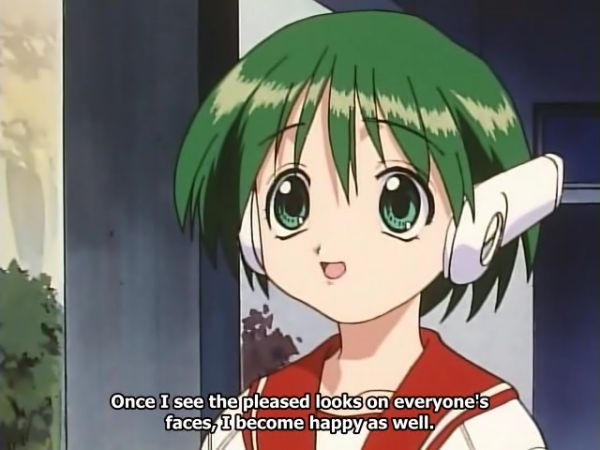I am happy to be alive! says Pollyanna, in the anime “Ai Shoujo Pollyanna Story” (Love Girl Pollyanna Story). You have probably heard about Pollyanna, it is almost a common noun in English. But is a Pollyanna born or made?
My one courageous commenter asks me what I believe is the reason why some people are happier than others. This is a main interest of mine – after all, almost all westerners want to be happy – and I have written about it occasionally for years. This seems like a good time to present my current view, which has developed a bit over time.
1) Genetic foundation for happiness. Â Whether you call it evolution or intelligent design, you have the same dilemma: Humans know about their mortality, and if they really want to, they can kill themselves. Therefore, there are limits to how much depression you can pile up on them before they quit. Conversely, if people tend toward extreme happiness, they don’t invest a lot of thought and energy in improving their situation. In the extreme case, this could threaten their life, as in not gathering food for the winter. Â Before it gets that far, they are anyway unlikely to procreate, since they are happy without sex.
So basically, there is a range of possible happiness that will let you survive and reproduce. If your genes take you outside those limits, those genes are lost.
Modern society has widened that range, since depressed people can now be medicated, and people who live without concern can get food for free.
2) Physiological changes. Conditions in early childhood can change a person’s capacity for happiness, as well as for other emotions. Malnutrition is an example, but physical abuse in childhood and low levels of contact can also cause the brain to not develop to its potential.
3) Psychological conditions. Apart from the physical changes to the brain from extreme life conditions, there are the “software” changes to the growing mind from various experiences in childhood, and to some extent even later. A good childhood may not save you from a depression that comes from brain chemistry gone wrong, but it will push you toward the upper reaches of happiness if you’re average at the outset.
4) Lifestyle. Poor people are less happy than others, but rich people are not much happier than ordinary workers, and the middle class does not become happier as it becomes richer. Once you have the basics – I have seen the phrase “$10 000 a year” bandied around, but I suppose this will change as the dollar falls – other things than money count more.
The employed are happier than the unemployed, even adjusted for the income. (In some European countries, the difference is not all that huge. If you have several children, you can earn more by being unemployed.)
Married men are happier than unwed men, with divorced men the least happy of all. Married women are happier than unmarried women, on average, but unlike the men women often become happier after divorce. Â Having children does not at all add to a couple’s happiness, actually it detracts just a little, but losing them causes great unhappiness, whether it is to death or separation. People who have many different sex partners are less happy than those who have one, but happier than the involuntarily celibate.
People who have many friends are happier than people who have few friends, but it is a diminishing return. Having no friends or very few is bad, but the difference from 30 to 300 is not all that great. Still, every little Facebook friend adds to your happiness. Â There is a reason for this, but I don’t remember if I have written about it.
5) Choices. While you can not always choose to be employed or married, you can usually choose whether or not to read. People who read a lot of books are happier than those who don’t. Both quantity and quality of the literature seems to have an effect here.
Religious people are generally happier than others, with Buddhists seemingly the happiest of the bunch. Among the religious, attendance at church / synagogue / temple etc is a pretty good indicator of happiness and also of longevity, if other things are equal.
People who meditate are happier than people who don’t meditate. This is the case even if they don’t attend a temple or profess any particular religion.
People who are physically active, especially outdoors, are happier than those who just sit there. This may conflict with the part about books, but it helps to not have a TV. People who don’t have a TV are happier than those who have. TV is particularly bad for married people. Â There is a reason for this too.
Optimists are happier than pessimists. People who force themselves to smile become happier than those who don’t. People who keep track of their blessings and of the good things that are done to them become rapidly happier, people who keep track of bad things that happen to them and especially injustice done against them become rapidly unhappy. These are things you can partly do something about, by keeping a gratitude diary etc.
But the single greatest source of happiness is the decision to make others happy. Those who each day look for opportunities to be of help to others, without asking for anything in return, are certain to become happier over time, and their happiness is a lasting one. On this both religion and science agree.
There are some things that could have been added, but I think this alone is enough. There is definitely a trend in it, and I hope you see this. Even if you are dealt bad cards at the start of your life, there will be many chances to throw away a card and pull a new and better. So no matter who you are, you can eventually have a winning hand, having achieved lasting happiness in this life on Earth.
***
I must admit that it was largely by accident I became as happy as I am now. I made some right choices, but I did not do so because I knew this would bring me happiness. On the contrary, it was my surprise at my own happiness that caused me to start looking into the science of human happiness. Â But if I can help someone, anyone, choose the path to happiness on purpose, I would delight in doing so. The more happy people in the world, the better!










